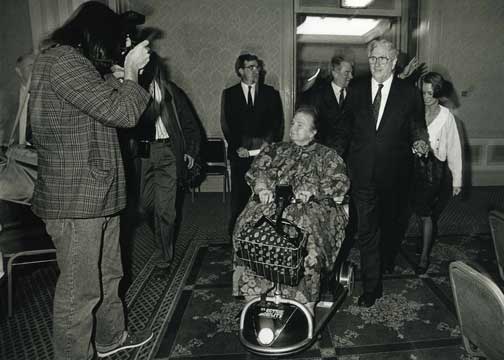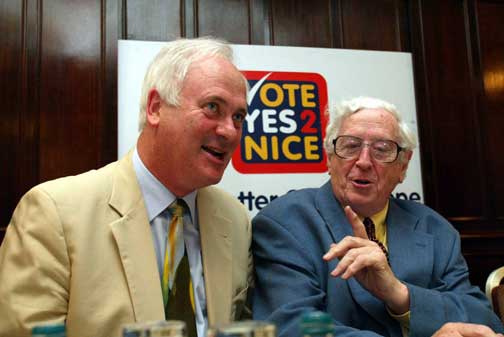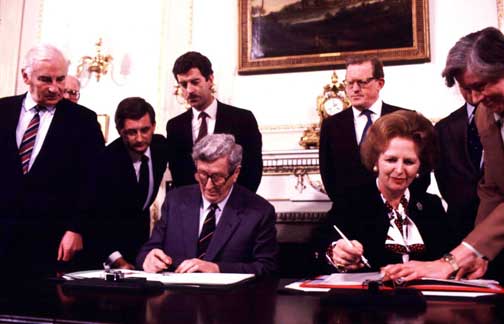


SERVICES
Tuesday May 24, 2011
Dr Garret FitzGerald (1926-2011)
Dr Garret FitzGerald (1926-2011) By Vincent Murphy Peacemaker, ardently pro-European, socially progressive, a master statistician, economist, influential columnist - many words have been used to accurately describe the late Dr Garret FitzGerald since his death last week. But in many ways he was defined by what he was not, or more to the point, who he was not. Dr FitzGerald's great rivalry with his old college mate Charles Haughey dominated Irish politics in the 1980s. And in contrast to Haughey's roguish, boorish personality, FitzGerald was an intellectual, who had an integrity that was beyond question. And when the history books are written, references to Haughey will concentrate largely on the lavish lifestyle he enjoyed, and the donations from businessmen that he used to fund it. References to FitzGerald will describe a man committed to public service, who at all times strived to do what he believed was best for Irish society, and who right up until his death continued to contribute to and influence debate on the country's direction. Haughey's legend may be greater, but FitzGerald's legacy may well outlast it. Garret FitzGerald was born on February 9th 1926 in Dublin. Both of his parents had been involved in Sinn Fein during the War of Independence and were in the GPO in 1916. But they came from very different backgrounds. His father Desmond was from a Catholic Munster family, although born and raised in London, and his mother Mabel came from an Ulster protestant family. Desmond took the pro-Treaty side during the Civil War, while his wife strongly opposed it. For this reason, Garret was uniquely placed to appreciate the complexities of the Northern Irish peace process - he had lived it in his own family. His father Desmond was Minister for External Affairs in the Free State government at the time Garret was born. Garret was educated at Belvedere College, and by the age of 14 had spent two summers in France learning the language, and beginning a life-long love affair with the country. In University College Dublin, he studied History, French and Spanish. It was there he met his wife Joan O'Farrell, who he married in 1947 and with whom he enjoyed a famously close relationship. A contemporary of his in UCD was Charles Haughey, who would become his great nemesis in Irish politics. After college, he joined Aer Lingus as an administrative assistant, and supplemented his income as a freelance journalist. FitzGerald was a passionate statistician, and would study in detail rail and airline timetables. In 1949, he analyzed the earliest published Aeroflot timetables, and produced one of the first accurate estimations of the size of Russia's airliner fleet for News Review in London. He became a regular contributor to the Irish Times, Financial Times and Economic Intelligence Unit. In 1959 he left Aer Lingus and became a junior lecturer in economics at UCD, and worked on a number of State boards as an advisor.
Former Fine Gael leader Garret Fitzgerald with his wife Joan at the Burlington Hotel in 1990. Austin Curry gives a wave while Jim Mitchell (left) looks on (Photocall) Therefore, even before his entry to politics, FitzGerald was a key contributor to the debate on the Irish economy. It was in the mid-1960s that he became more closely involved in Irish politics. Although it was the party of his father, and the one he would later lead himself, there was no guarantee that it would be Fine Gael that he joined. In fact, many have said he could easily have joined Fianna Fail or Labour - his interest was never tribal in that way. But after helping to draft the blueprint for The Just Society for Declan Costello, he stood for the Seanad in 1965 and was soon promoted to its front bench by new FG leader Liam Cosgrave. During his four years in the Seanad he promoted Ireland's entry to the EEC. He was first elected to the Dail in the 1969 general election, becoming the party's spokesman on education and later finance. But tensions arose with his party leader, as FitzGerald and others began to articulate a more socially liberal vision of policy in areas like contraception and divorce. When Fine Gael and Labour took power in 1973, Fitzgerald was appointed Minister for Foreign Affairs. For several years, the EEC and Northern Ireland took center stage in his life. He helped make Ireland's first presidency of the EEC a success in 1975, impressing foreign ministers and officials who were unused to working with Irish representatives of his caliber. He was also a key negotiator of the Sunningdale Agreement which led to a short-lived power-sharing executive in Northern Ireland. After Fianna Fail regained power in the 1977 election, FitzGerald took over the leadership of Fine Gael without a contest. He threw himself into reinventing the party, producing a 25,000 word document outlining to his colleagues where he believed their policy should be on a range of social, political and economic issues. By the time of the next election, Charles Haughey had taken over as leader of Fianna Fail and Taoiseach, someone FitzGerald described as having "a flawed pedigree" on the day of his nomination. But morale in Fine Gael had improved and the 1981 election saw them achieve their best ever result, and they entered coalition with Labour, with the support of a number of Independents. FitzGerald and his government took over public finances in real trouble after the free-spending years of Haughey and his predecessor Jack Lynch. That year the new Taoiseach signaled his "Constitutional Crusade" to create a more pluralist Ireland, where social laws would be relaxed and progressive. But his government was to be short-lived. A decision to introduce VAT on children's clothes and footwear led to the collapse of the government in February 1982. However, Charles Haughey's reign as Taoiseach lasted only nine months, and in November 1982, a third election in two years was held, and Fine Gael swept back into power.
Former Taoiseach and FG leader Garrett Fitzgerald and Former Taoiseach and Fine Gael leader John Bruton TD (left) at a Vote Yes to Nice press conference at Buswell's Hotel, Dublin in 2002 (Photocall) This government would last longer, but the country continued to face an economic crisis, which led to many unpopular decisions and tensions between the coalition partners. FitzGerald was persuaded to hold a referendum to introduce anti-abortion laws to the constitution in 1983. He himself opposed the wording of the amendment, on legal advice, but many in his party supported it, as did Fianna Fail and Catholic bishops. The amendment passed with an overwhelming 2-1 majority in an embarrassment to Taoiseach Fitzgerald. His constitutional crusade also failed to introduce divorce in a referendum in 1986, although he did manage to pass sensible contraception legislation in 1987. Divorce has since been introduced in Ireland, his legal advice on the wording of the abortion amendment was vindicated in the X case during the 1990s, and much of the social progress he yearned for has since been achieved. His stances during the 1980s undoubtedly contributed hugely to this, despite making him unpopular to many at the time. Relations between Ireland and Britain were poor when he took over as Taoiseach. Violence continued to rage in Northern Ireland. In 1983 he set up the New Ireland Forum, which brought together constitutional nationalists, with the aim of gaining a consensus on how to negotiate a new agreement with Britain. Its recommendations were rejected by British Prime Minister Margaret Thatcher, but he continued to negotiate and the result was the 1985 Anglo-Irish Agreement, the highlight of his second term in office. For the first time since 1921, the Agreement gave Dublin a formal consultative role in the affairs of Northern Ireland. Unionists baulked at the agreement, and Haughey, at least initially, derided it too. But with the benefit of hindsight, it can now be seen as a foundations stone for the peace process and the Good Friday Agreement which came 13 years later. He enjoyed a much better relationship with Lady Thatcher than Charles Haughey. Once he was asked if he liked the "Iron Lady", and he replied, "It didn't really matter as long as she liked me". The coalition government came to an end in 1987, with Labour Ministers walking out as tensions over economic policy grew too big. He resigned as leader of Fine Gael the next day. He continued to serve in the backbenches of the Dail until 1992, when he retired from formal politics.
Taoiseach and FG Leader Dr Garrett Fitzgerald and British Prime Minister Margaret Thatcher signing the Anglo Irish Agreement in Hillsborough, outside Dublin, in 1985. In the background are Dick Spring (third left) and Tom King (second from right) (Photocall) However, his contribution to public debate in Ireland never ended. He campaigned vigorously in some political campaigns, most notably referenda on EU reforms in the Nice and Lisbon Treaties. He served as chancellor of the National University of Ireland for 12 years (1997-2009), lectured and travelled widely. His Saturday column for the Irish Times remained required reading for anyone interested in Irish public affairs right up until he was taken ill a short few weeks ago. He even appeared on television as a commentator on RTE during the recent general election. Garret FitzGerald had become something of a national treasure by the time he died. He was looked upon fondly by people from across the political perspective, and his utterances were taken seriously and remained influential. Part of the affection can surely be attributed to his "dotty professor" demeanor, his mumbling speech at times infuriating, and by times endearing. He was accused of political naivety by some, but others say he was more shrewd than he like to pretend. His eccentricity alienated some, but won over others. On the campaign trail, he was once photographed wearing two different shoes, remarking that he was "too busy to worry about such trivial things". His cabinet meetings would go on for hours, leaving colleagues exhausted and exasperated, as he tried to ensure decisions were made by consensus rather than majority vote around the coalition table. He once reportedly said, "That's fine in practice, but will it work in theory?" In all his life, there was only ever one whiff of scandal. After leaving politics he was appointed a director of Guinness Peat Aviation, and he borrowed substantial amounts of money in anticipation of the public flotation of the company. When it never happened, he was left with massive debts, and Allied Irish Bank wrote off close to £200,000. The bank's chairman at the time was Peter Sutherland, a former Fine Gael attorney general, and he denied any role in the debt write off. The matter was investigated by the Moriarty Tribunal, but in its report it pointed out that, unlike Haughey who had kept his assets virtually intact, Dr FitzGerald had sold his family home and virtually everything else he owned in a bid to pay off the money he owed. It's this integrity that was so widely admired. Garret FitzGerald was probably the most intellectual politician of his generation, and he had a huge role in shaping the modern Ireland. He has been an ever-present influence and voice in Irish political discourse for the past half century, and his death leaves a gaping hole. |
CURRENT ISSUE

RECENT ISSUES


SYNDICATE
[What is this?]
POWERED BY

HOSTED BY

Terms of Service | Privacy Policy
Website Design By C3I









